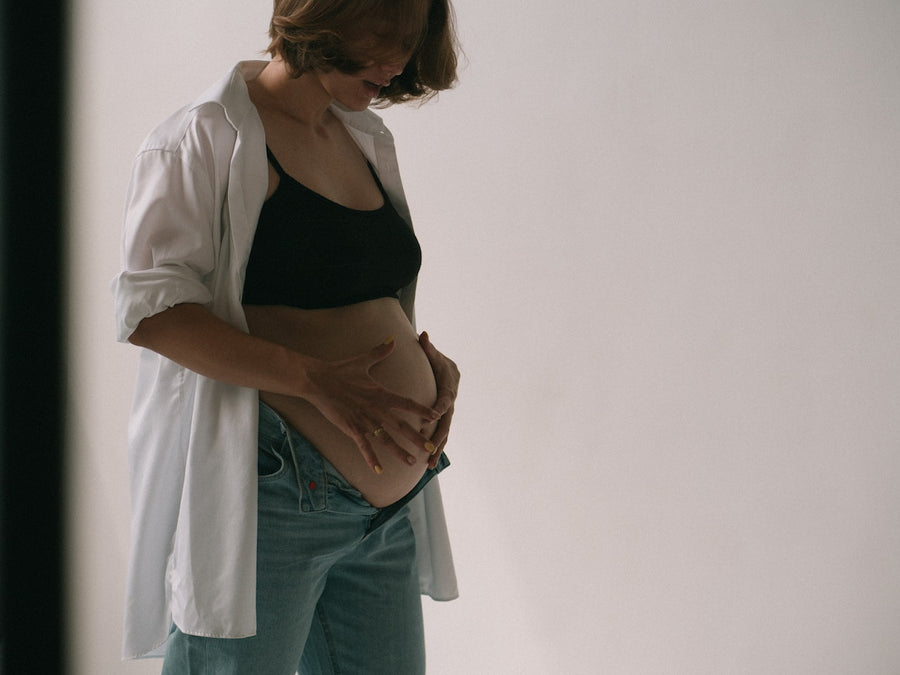Body Image During Pregnancy

What Is Body Image?
Body image refers to how someone thinks and feels about their physical appearance, features, and any related behaviors. [1] Body image includes how someone feels about themselves when looking in the mirror or picturing their body, including their height and weight, size, symmetry, and more. A healthy body image means you feel comfortable in your body and feel good about how you look. A negative body image means you feel uncomfortable in your body, have low self esteem, or other negative feelings associated with your body and outward appearance. [1] A negative body image can put someone at a higher risk of various conditions, such as eating disorders and depression. Body image issues are a common problem, especially among women and others assigned female at birth (AFAB). [1]
Body Image and Pregnancy
Pregnancy can be an extremely rewarding and beautiful experience, but it also leads to many physical and emotional challenges. The harsh reality is that pregnancy will cause changes to your body, and some may be uncomfortable or difficult to come to terms with. While this is a natural part of growing a human, it’s not always easy for people to maintain a positive body image during and after pregnancy.
How Does Pregnancy Affect Body Image?
Pregnancy can lead to many different physical changes, including stretch marks, weight gain, swelling, hair changes, skin changes, and more. While some of these changes are temporary, many can stick around for weeks, years, or even permanently after pregnancy. These changes, as well as the mood swings, hormonal changes, and potential mental health challenges that can occur during or after pregnancy can all lead to negative body image. [1] If you are having a difficult time with your body image, know that you aren’t alone, and you shouldn’t feel guilty for having these feelings. It is important to speak with your healthcare provider if you’re struggling with any mental health concerns and to find ways to pamper yourself and boost your self esteem.
What Is Body Dysmorphia?
Body dysmorphia disorder (BDD) is a mental health condition that involves feelings and beliefs about one’s appearance and body image. [2] Those with body dysmorphic disorder have a perceived flaw or preoccupation with their appearance that is extremely difficult to control and can lead to repeated behaviors such as checking a mirror, grooming, seeking reassurance, etc. [2]
Symptoms of Body Dysmorphia:
Some potential signs of body dysmorphic disorder include [2]:
- Spending a lot of time focusing on appearance or a perceived flaw that appears minor or nonexistent to others
- A strong belief that you have a defect in your appearance that makes you ugly or deformed
- Engaging in repetitive behaviors aimed at fixing or hiding a perceived flaw that is difficult to resist or control
- Attempting to hide one’s appearance or perceived flaw with styling, clothes, makeup, cosmetic procedures, etc.
- Seeking reassurance about one’s appearance frequently
- Avoiding social situations
Those with body dysmorphia may fixate on one or more parts of their body, and the bodily feature(s) they focus on can change over time. Some common features people tend to fixate on include their facial features, complexion, wrinkles, hair, skin, breast size, genitalia, muscle size, and more. [2]
Who Experiences Body Dysmorphia?
BDD can appear in anyone and is not limited to any specific age group, sex, or race. It’s estimated that less than 3% of adults in the United States struggle with BDD, and the condition is seen equally in both men and women. [3] BDD rates in adolescents and college students do tend to be higher among females than males, and two-thirds of people with BDD will have onset before age 18. The average age of onset tends to be around 16-17. [3]
Can Pregnant People Have Body Dysmorphia?
Yes, it’s possible that pregnant people can have body dysmorphia, although the condition is rare and typically diagnosed during adolescence. While body image is a concept that applies to everyone, body dysmorphia is a specific, diagnosable mental health condition. If you are struggling with body image or are concerned that you have BDD, you should speak to a healthcare provider.
How To Deal With Negative Body Image During Pregnancy
If you are having a difficult time adjusting to your new pregnant or postpartum body, you’re not alone. Here are some strategies that can help you deal with body image issues during pregnancy.
Take Care of Your Mental Health
As stated already, a negative body image can increase your risk for depression, eating disorders, BDD, and other conditions. [1-2] It’s important to take care of your mental health throughout pregnancy and postpartum. Whether you want to try out therapy, medications, or other alternative treatment options, you should speak to a healthcare provider about what might help you navigate your negative thoughts and emotions.
Treat Yourself
If anyone deserves a little TLC, it’s pregnant and postpartum moms! Look into prenatal massages, a prenatal yoga class, take a relaxing bath, buy yourself a new book, or rent a movie you’ve been wanting to see. Find ways to improve your emotional well-being and you may even notice that your body image will improve as well.
Try Healthy Exercise
Even though many changes to your body are unavoidable and may not be easily changed, a healthy diet and healthy exercise can both improve your mental health, clear your mind, aid in weight loss, etc. Just be sure you’re sticking to provider-approved exercises, especially if you’re pregnant or healing from childbirth. Learn how to lose weight safely while breastfeeding, or read up on postpartum exercise.
Work On Acceptance
This step may actually be the hardest, but it’s one of the most important. It’s easier said than done, but trying to love and accept your body for what it is is crucial for a healthy body image. Even if it doesn’t look how you were hoping it would, your body has carried you through amazing feats in your life- growth spurts, getting pregnant, breastfeeding, childbirth, playing sports, trying new activities, and so much more. The most long-lasting signs of pregnancy like stretch marks are just proof of what you’re capable of.
Be Honest
It’s important to be honest about how you’re feeling. Getting these emotions off of your chest can be a huge step towards healing and beginning to feel better. Whether you decide to tell your partner, friend, family, or healthcare provider, getting those thoughts out in the open can be very helpful.
Support Your Pregnancy With Natalist
At Natalist, we’ve experienced the many highs and lows that come with fertility, pregnancy, and parenting. Pregnancy causes a lot of changes that are out of our control, and it’s normal to have mixed emotions about the way you feel and look. Keep in mind that your body is supposed to change during pregnancy and is helping you grow your family. If you are struggling with body image issues or believe you may have body dysmorphic disorder, you should speak to your healthcare provider. Speaking to a therapist can be extremely beneficial for overcoming a negative body image. You can also pamper yourself with some self-care products such as belly oil, biotin for hair and skin health, cooling cream, and more. Give yourself grace as you continue to support your baby during pregnancy or recover from childbirth. We are in awe of you and your body, and you should be too!
References:
- Body image. Office on Women's Health. February 2021. https://www.womenshealth.gov/mental-health/body-image-and-mental-health/body-image
- Body dysmorphic disorder. Mayo Clinic. December 2022. https://www.mayoclinic.org/diseases-conditions/body-dysmorphic-disorder/symptoms-causes/syc-20353938
- Body Dysmorphic Disorder. Anxiety & Depression Association of America. https://adaa.org/understanding-anxiety/body-dysmorphic-disorder
Reach Out, We're Here
Have questions about your order or products? For the speediest answer, check out our FAQ section. Need something else? Come find us below.
Please keep in mind our regular business hours; Monday-Friday, 9am-5pm CT.
Customer Support
support@natalist.com
Press Inquiries
media@everlyhealth.com
Business & Partnerships
team@natalist.com
Affiliates + Influencers
team@natalist.com
Job Openings
Careers Page























